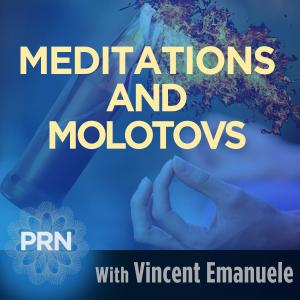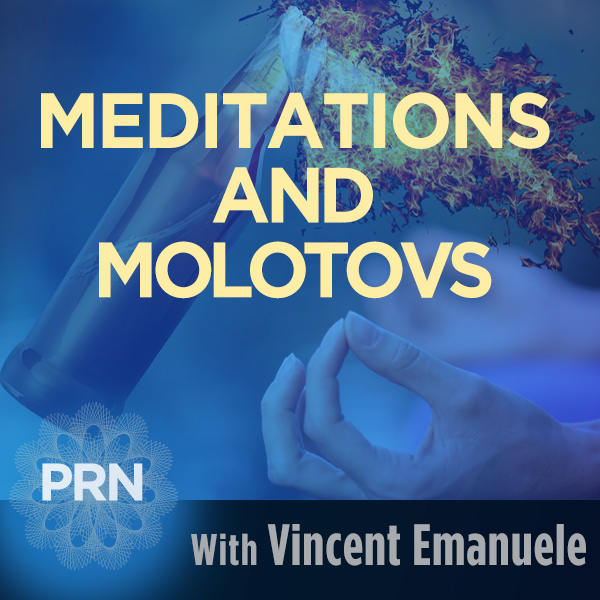Episodes

Wednesday Dec 13, 2017
Meditations and Molotovs - 12.13.17
Wednesday Dec 13, 2017
Wednesday Dec 13, 2017

Wednesday Dec 06, 2017
Meditations and Molotovs - 12.06.17
Wednesday Dec 06, 2017
Wednesday Dec 06, 2017
Show Description - Monday, December 4th, 2017: Exactly one year ago, Sergio Alexander Kochergin, Tony B, Vincent Lenartand I traveled to Standing Rock with thousands of veterans from throughout the U.S. to help indigenous peoples stop the construction of an oil pipeline. Unfortunately, we failed. Today, I'll reflect on those experiences and the past year of organizing in the age of Trump.

Tuesday Nov 14, 2017
Meditations and Molotovs - 11.13.17
Tuesday Nov 14, 2017
Tuesday Nov 14, 2017
Today, Meditations and Molotovs airs live from PARC - Politics Art Roots Culture. Yes, you heard that right: we're back to live programming! Vince will be discussing the ongoing organizing work that's taking place in Northwest Indiana and the importance of organizational vision and structure. Organizing is much more an art than a science, nevertheless some techniques and principles work better than others. Let's talk about what works, and what doesn't.

Monday Sep 25, 2017
Meditations and Molotovs - 09.25.17
Monday Sep 25, 2017
Monday Sep 25, 2017
On today's program, Vince speaks with Paul Street about Capitalism, Eco-Socialism, Structural Racism, Political Organizing, the NFL and Vietnam.
Paul is an independent radical-democratic policy researcher, journalist, historian, author and speaker based in Iowa City, Iowa, and Chicago, Illinois. He is the author of seven books to date: Empire and Inequality: America and the World Since 9/11 (Boulder, CO: Paradigm, 2004); Segregated Schools: Educational Apartheid in the Post-Civil Rights Era (New York: Routledge, 2005); Racial Oppression in the Global Metropolis: a Living Black Chicago History (New York: Rowman & Littlefield, 2007); Barack Obama and the Future of American Politics (Boulder, CO: Paradigm, 2008); The Empire’s New Clothes: Barack Obama in the Real World of Power (Paradigm, 2010); (with Anthony DiMaggio) Crashing the Tea Party: Mass Media and the Campaign to Remake American Politics (Paradigm, 2011); and They Rule: The 1% v. Democracy (Paradigm, 2014). Paul writes regularly for Truthdig, telesur English, Counterpunch, Black Agenda Report, and Z Magazine.

Monday Sep 18, 2017
Meditations and Molotovs - 09.18.17
Monday Sep 18, 2017
Monday Sep 18, 2017

Monday Sep 11, 2017
Meditations and Molotovs - 09.11.17
Monday Sep 11, 2017
Monday Sep 11, 2017
On today's program, Vince speaks with Charles Derber, who is a professor of sociology at Boston College.
Derber is a prolific writer. Derber's work falls into three major categories. One is a critique of individualism and American culture. In 2000, Oxford University Press printed a 20th year commemorative edition of 'The Pursuit of Attention', marking its status as a classic sociological work. It focuses on ego-centeredness and 'conversational narcissism' in everyday life as structured by class, gender and America’s individualistic culture. Derber's book, 'The Wilding of America', in its fifth edition, is a widely used text in American sociology. It offers a sharp critique of the American Dream and the crisis of hyper-individualism.
Derber is known as a public sociologist who writes for general audiences, offering not only sociological critiques but alternative visions. He appears frequently on talk shows, has written opinion pieces for media including the International Herald Tribune, the Boston Globe, the Christian Science Monitor, Newsday and Tikkun, and is a regular contributor to Cognoscenti, the opinion page of WBUR, Boston's NPR station. He is one of the most prominent contemporary exemplars of the sociological imagination as championed by C. Wright Mills, and, like Mills, he believes in the importance of melding critical scholarship with social justice activism. Derber has long been active in the peace, environmental and labor movements, from his 1960s work to register African-American voters in the Mississippi Freedom Democratic Party and his opposition to the Vietnam War to current movements such as Occupy and the struggle to prevent climate change and transform global corporate capitalism into a robust economic and political democracy.

Monday Aug 28, 2017
Meditations and Molotovs - 08.28.17
Monday Aug 28, 2017
Monday Aug 28, 2017
Show Description - Monday, August 28th: On today's program, Vince finishes the series "Racism: A History -A Savage Legacy"
In the name of civilising 'the African,' 90% of Africa was divided among the European powers. Leopold II of Belgium set out to become personally wealthy through his seizure of the Congo, where extreme violence, mutilation and other coercive methods forced the local people to obtain rubber and other raw materials. Between 1880 and 1920 about 10 million people, were killed, yet Leopold built an opulent museum to the colonisation of the Congo, which became the venue of one of the first so-called Human zoos that toured Europe throughout the end of the 19th and beginning of the 20th century.Then the words genocide, holocaust and racism became used in connection with the Nazi treatment of the Jews and it became clear that these were abhorrent. However, it did not change the way things were done towards people of colour.
In South Africa the system of racial classification did not have the intention of exterminating the black population created a bureaucracy to determine and enforce access to resources along racial lines. This included an illusory face of democracy which enabled the government to obtain the support of international governments. After the Sharpeville massacre, the banning of the ANC and arrest of Nelson Mandela, the attacks became increasingly violent and deaths mounted up. In 1976 student riots led to many schoolchildren being killed as well as Black Consciousness leader Steve Biko. Practically every family in South Africa was in some way affected by the killings and torture.
It comes as no surprise that many countries supported South Africa. In the United States African American soldiers returning from the war in 1946 were lynched at the rate of one a week. Protests led finally to the passing of anti-lynching laws. When schools were desegregated, violence erupted, resulting in the death of 14-year-old Emmett Till in 1955, the photo of whose mutilated face, testimony of extreme viciousness and hate, bore witness of the white man's savagery towards blacks. Four months later the Civil Rights Movement was born, having to deal with years of violent resistance and the murder of two of its leaders, Martin Luther King Jr. and Malcolm X. However, even the civil rights legislation could not alleviate the ubiquitous poverty.

Monday Aug 21, 2017
Meditations and Molotovs - 08.21.17
Monday Aug 21, 2017
Monday Aug 21, 2017
On today's program, Vince plays Part Two of "Racism: A History" - 'Fatal Impacts.
Part Two examines the controversial theories of Social Darwinism and Scientific Racism, concepts invented during the 19th century. Both ideologies that drew on now discredited practices such as phrenology and provided an ideological justification for racism, slavery and the violence of colonization. These theories ultimately led to eugenics .These same racial theories lived on into the 20th century to become part of the ideology that underpinned the Third Reich and Nazi racial policies of the master race.

Monday Aug 21, 2017
Meditations and Molotovs - 08.14.17
Monday Aug 21, 2017
Monday Aug 21, 2017
On today's program, Vince plays Part One of the BBC documentary film, "Racism: A History - Part 1: The Colour of Money"
Part One of the series begins by assessing the implications of the relationship between Europe, Africa and the Americas in the 15th century. It considers how racist ideas and practices developed in key religious and secular institutions, and how they showed up in writings by European philosophers Aristotle and Immanuel Kant.

Monday Jul 31, 2017
Meditations and Molotovs - 07.31.17
Monday Jul 31, 2017
Monday Jul 31, 2017
On today's program, Vince airs Wendy Brown's lecture, "In the Account of Neoliberalism."
Wendy Brown is Professor of Political Science at the University of California Berkeley. Her research interests include the history of political and social theory, Continental philosophy, and critical theory, together with the examination of contemporary capitalism. In her research into the problems that plague contemporary capitalism and neoliberalism, she employs theoretical works of Michel Foucault, Max Weber, Sigmund Freud, Friedrich Nietzsche, Karl Marx, and Frankfurt school.

